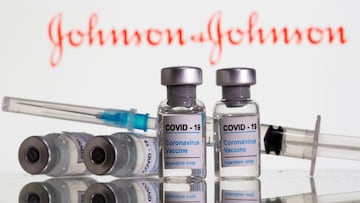Should J&J vaccine recipients receive a booster or new dose?
New research shows that J&J covid-19 vaccine is less effective against the Delta variant suggesting those who got the one-dose vaccine may need another.

As the highly-contagious Delta covid-19 variant pushes infection rates up again in all 50 states and raising concerns worldwide the findings from a new study released on Tuesday would indicate that another dose may be necessary for those who got the Johnson & Johnson vaccine.
Johnson & Johnson says that its vaccine is effective against the variant according to smaller studies the drugmaker published earlier this month. Even so, other health experts are advocating that people should get two doses to achieve better performance.
Also see:
- How will the delta variant affect unemployment benefits?
- How has the covid-19 delta Variant affected Stock Markets?
- When is Canada opening borders to US travelers? What restrictions are there?
- How has the covid-19 delta variant affected travel restrictions?
Johnson & Johnson covid-19 vaccine much less effective against Delta and Lambda variants
Dr. Rochelle Walensky, director of the Centers for Disease Control and Prevention, said at a Senate hearing on Tuesday that the Delta variant now accounts for 83 percent of new infections in the US. The findings of the new study, which hasn’t been peer reviewed yet, show that the Johnson & Johnson covid-19 vaccine has reduced efficacy against the Delta and Lambda variants. Research from the UK that could corroborate the new study shows a single-dose AstraZeneca vaccine, which is similar to the Johnson & Johnson vaccine, has only about 33 percent efficacy.
Based on its own data Johnson & Johnson says that its vaccine “generated strong, persistent activity against the delta variant and other highly prevalent variants.” Additionally, the drugmaker said the studies show that the vaccine's protection strengthened over time.
“The Delta variant ... is one of the most infectious respiratory viruses we know of and that I have seen in my 20-year career.”
— The Recount (@therecount) July 22, 2021
— CDC Director Dr. Rochelle Walensky pic.twitter.com/LxRNGrFQnE
Health experts recommend getting a second dose
Dr. Vin Gupta, a professor at the University of Washington’s Institute for Health Metrics and Evaluation, on CNBC said that his definition of fully vaccinated is “two doses of a vaccine.” He added “I do think that those one-shot J&Jer’s should be given the opportunity, while we complete our clinical trial ... I’m already telling my patients to do it, if they can get access to it.”
John Moore, a virologist at Weill Cornell Medicine in New York had a similar opinion to Dr.Gupta's. “I have always thought, and often said, that the [Johnson & Johnson] vaccine is a two-dose vaccine,” he told the New York Times. He felt the findings of the new study were more credible given that the research team had no ties to any of the vaccine manufacturers.
Dr. Nathaniel Landau, the lead author of the study told the New York Times "The message that we wanted to give was not that people shouldn't get the [Johnson & Johnson] vaccine, but we hope that in the future, it will be boosted with either another dose of [Johnson & Johnson] or a boost with the Pfizer and Moderna [vaccines]."
The Delta variant has triggered a fourth wave of the coronavirus pandemic, and new study suggests that the Johnson & Johnson vaccine may be less effective in protecting against it. Here's what experts are saying in the wake of the study's publishing. pic.twitter.com/2sQalegxmO
— The News with Shepard Smith (@thenewsoncnbc) July 20, 2021
No official call for a booster shot yet
Pfizer recently said that it would be seeking approval to begin clinical trials on a booster shot for its vaccine. The announcement was almost immediately followed by a joint response from the FDA and CDC saying "Americans who have been fully vaccinated do not need a booster shot at this time."
Related stories
Dr. Anthony Fauci recently touted the effectiveness of all three vaccines being used in the US. He said with regards to the Johnson & Johnson vaccine that it should be 92 percent effective against hospitalization caused by the Delta virus inferred from conclusions about the AstraZeneca vaccine in the UK.
Dr. Gupta felt the same saying “I think you’re protected, likely from the hospital and severe outcomes from say, the delta variant, based on what data we do have.”


